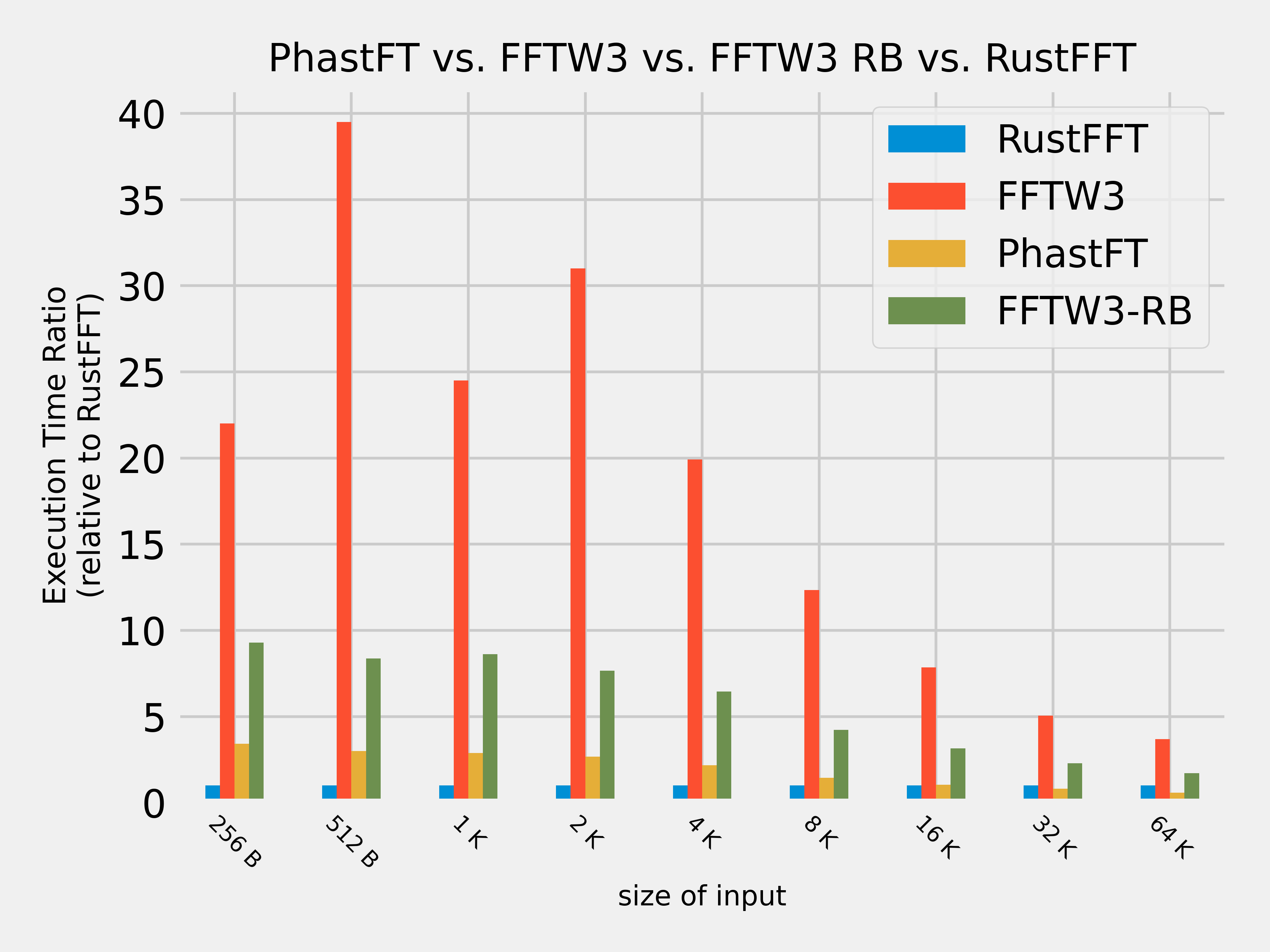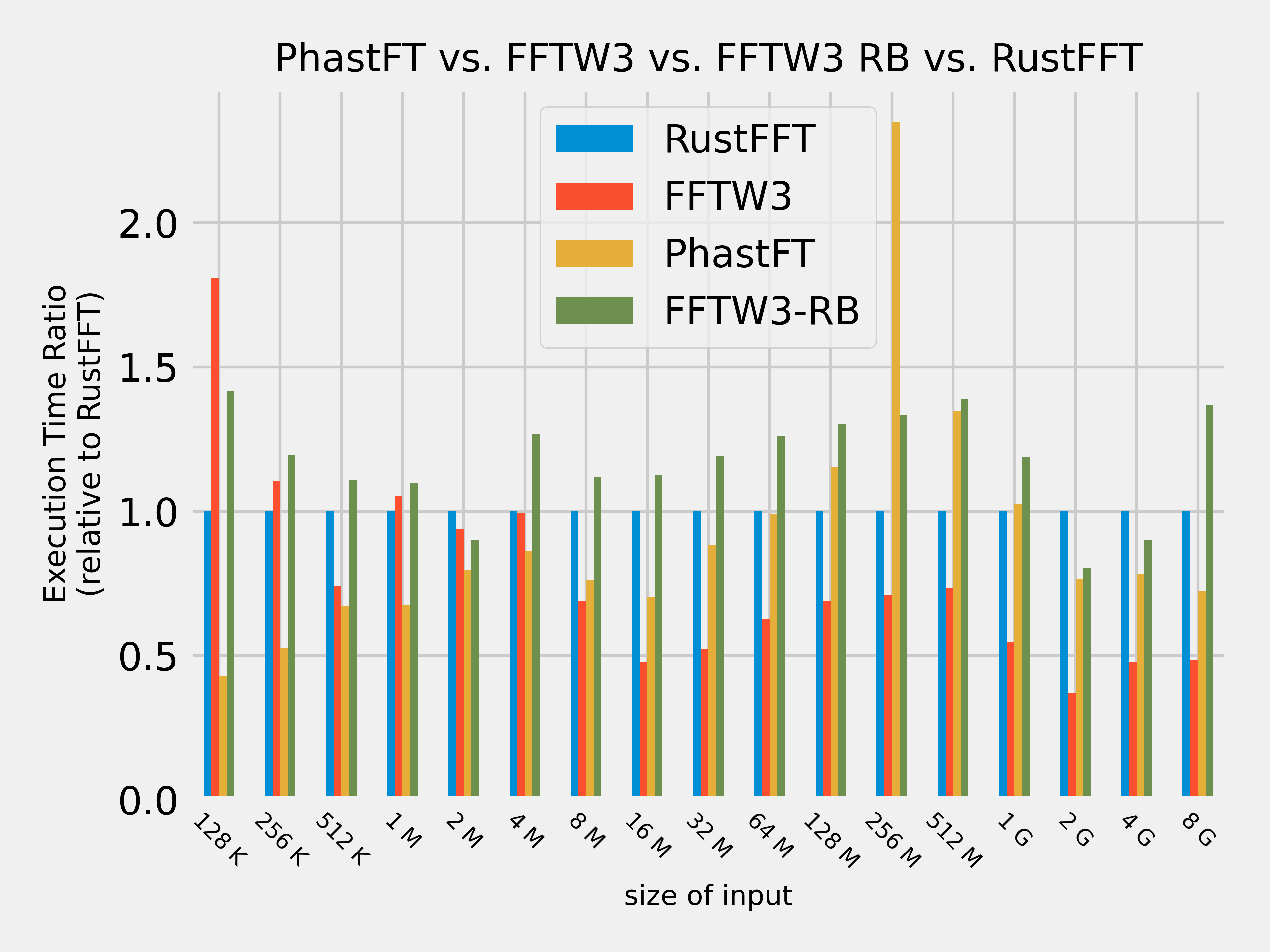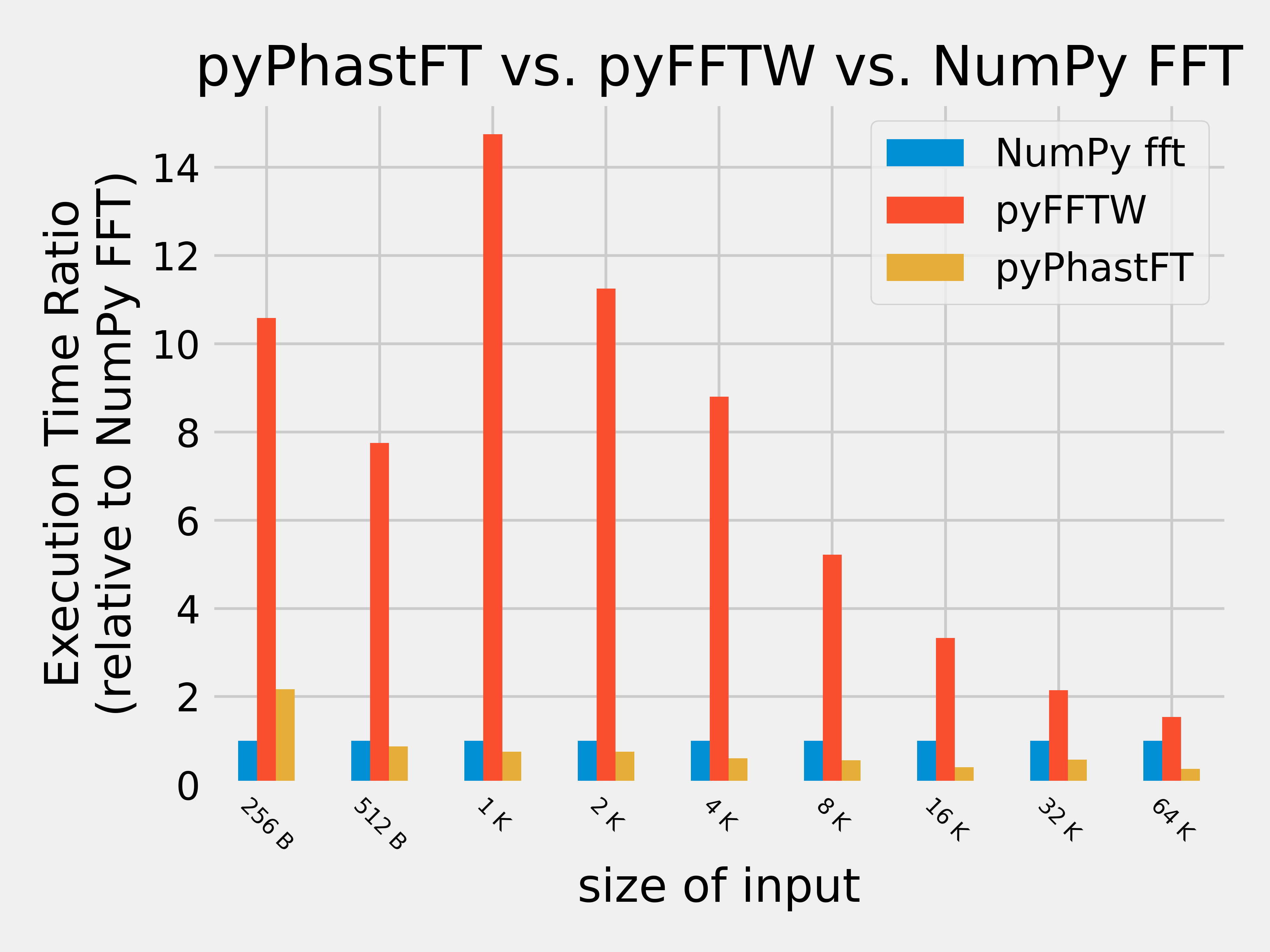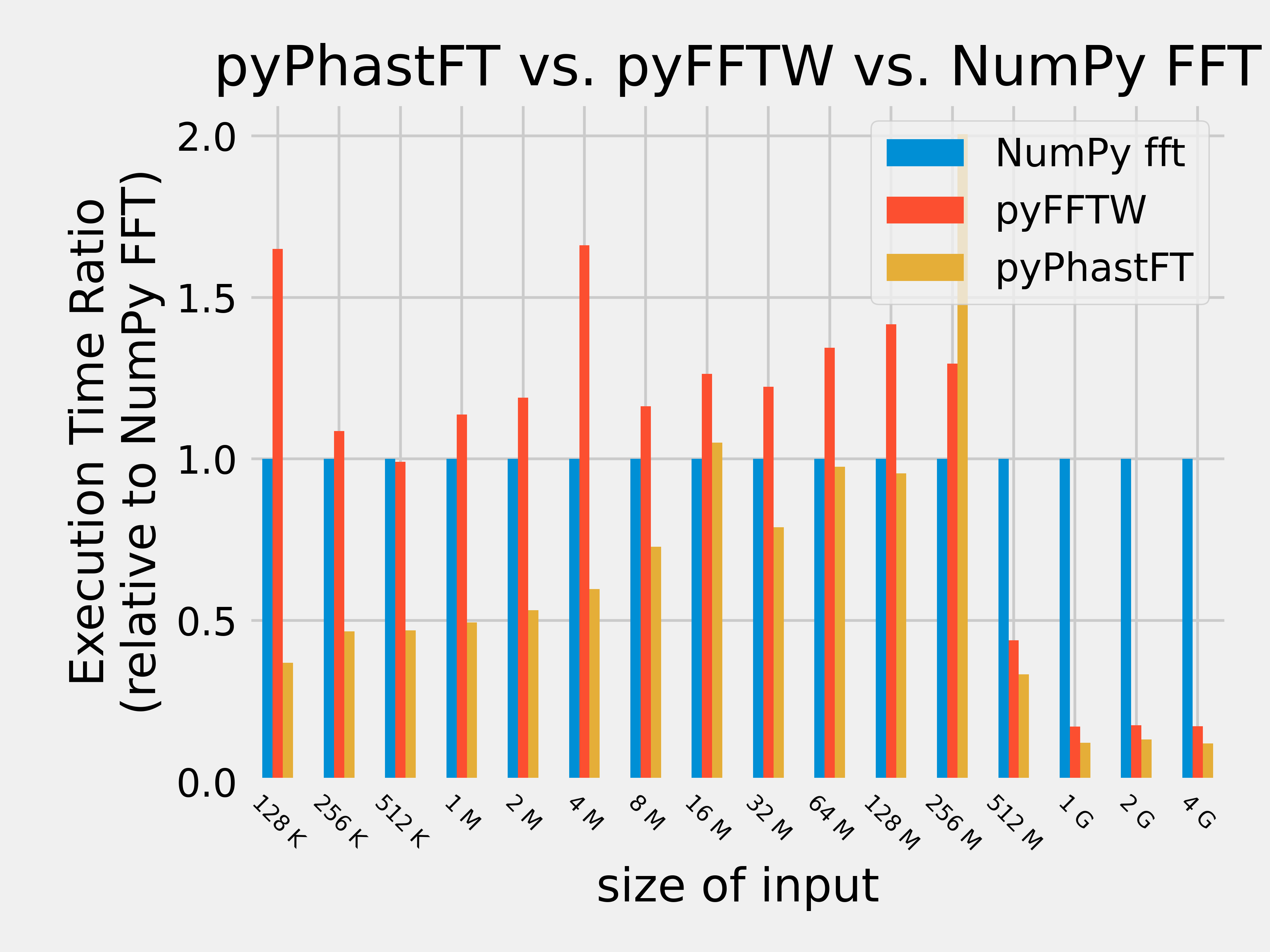PhastFT is a high-performance, "quantum-inspired" Fast Fourier Transform (FFT) library written in pure Rust.
Features
- Two FFT algorithms: Decimation-in-Frequency (DIF) and Decimation-in-Time (DIT) for different use cases
- Simple implementation using the Cooley-Tukey FFT algorithm
- Performance on par with other Rust FFT implementations
- Zero
unsafecode - Takes advantage of latest CPU features up to and including
AVX-512, but performs well even without them - Selects the fastest implementation at runtime. No need for
-C target-cpu=native! - Optional parallelization of some steps to 2 threads (with even more planned)
- Up to 5x lower memory usage than RustFFT
- Python bindings (via PyO3)
Limitations
- Only supports input with a length of
2^n(i.e., a power of 2) -- input should be padded with zeros to the next power of 2
Planned features
- Bluestein's algorithm (to handle arbitrary sized FFTs)
- More multi-threading
- More work on cache-optimal FFT
How is it so fast?
PhastFT is designed around the capabilities and limitations of modern hardware (that is, anything made in the last 10 years or so).
The two major bottlenecks in FFT are the CPU cycles and memory accesses.
We picked an efficient and well-known FFT algorithm. Our implementation can make use of latest CPU features such as
AVX-512, but performs well even without them.
Our key insight for speeding up memory accesses is that FFT is equivalent to applying gates to all qubits in [0, n).
This creates the opportunity to leverage the same memory access patterns as
a high-performance quantum state simulator.
We also use the Cache-Optimal Bit Reversal Algorithm (COBRA) on large datasets and optionally run it on 2 parallel threads, accelerating it even further.
All of this combined results in a fast and efficient FFT implementation competitive with the performance of existing Rust FFT crates, including RustFFT, while using significantly less memory.
Quickstart
Rust
use phastft::{planner::Direction, fft_64}; // Using the default DIF algorithm let big_n = 1 << 10; let mut reals: Vec<f64> = (1..=big_n).map(|i| i as f64).collect(); let mut imags: Vec<f64> = (1..=big_n).map(|i| i as f64).collect(); fft_64(&mut reals, &mut imags, Direction::Forward);
Using DIT Algorithm
use phastft::{fft_64_dit, fft_64_dit_with_planner, planner::{Direction, PlannerDit64}}; // Using DIT algorithm - may have better cache performance for some sizes let big_n = 1 << 20; let mut reals: Vec<f64> = (1..=big_n).map(|i| i as f64).collect(); let mut imags: Vec<f64> = (1..=big_n).map(|i| i as f64).collect(); // Simple API fft_64_dit(&mut reals, &mut imags, Direction::Forward); // Or with a reusable planner for better performance with multiple FFTs let planner = PlannerDit64::new(big_n, Direction::Forward); fft_64_dit_with_planner(&mut reals, &mut imags, &planner);
Complex Number Support (Interleaved Format)
When the complex-nums feature is enabled, you can also use the interleaved
format with the num_complex::Complex type:
use phastft::{ planner::Direction, fft_64_interleaved }; use num_complex::Complex; let big_n = 1 << 10; let mut signal: Vec<Complex<f64>> = (1..=big_n) .map(|i| Complex::new(i as f64, i as f64)) .collect(); fft_64_interleaved(&mut signal, Direction::Forward);
Both fft_32_interleaved and fft_64_interleaved are available for f32 and
f64 precision respectively.
Python
Follow the instructions at https://rustup.rs/ to install Rust.
Then you can install PhastFT itself:
pip install numpy pip install git+https://github.com/QuState/PhastFT#subdirectory=pyphastft
import numpy as np from pyphastft import fft sig_re = np.asarray(sig_re, dtype=np.float64) sig_im = np.asarray(sig_im, dtype=np.float64) fft(a_re, a_im)
Normalization
phastft only scales the output of the inverse FFT. Namely, running IFFT(x)
will scale each element by 1/N, where N is the number of data points, and
IFFT(FFT(x)) == x. If your use case(s) require(s) something different, please
don't hesitate to create an issue.
Bit Reversal and Output Order
PhastFT provides two FFT algorithms with different bit reversal behaviors:
DIF (Decimation-in-Frequency) - Default Algorithm
- Input: Normal order
- Output: Bit-reversed order (by default)
- Bit Reversal: Can be disabled using
Options::dif_perform_bit_reversal = false
The ability to skip bit reversal in the DIF FFT is useful in cases such as:
- Bit-reversed output is not required, potentially leading to significantly better run-times.
- You need the output in decimated order for specific algorithms
- Simulating the QFT
use phastft::{fft_64_with_opts_and_plan, options::Options, planner::{Direction, Planner64}}; let size = 1024; let mut reals = vec![0.0f64; size]; let mut imags = vec![0.0f64; size]; // Skip bit reversal for DIF FFT let mut opts = Options::default(); opts.dif_perform_bit_reversal = false; // Output stays in decimated order let planner = Planner64::new(size, Direction::Forward); fft_64_with_opts_and_plan(&mut reals, &mut imags, &opts, &planner);
DIT (Decimation-in-Time)
- Input: Normal order (bit-reversed internally)
- Output: Normal order
- Bit Reversal: Always performed on input (required for correctness)
Performance Notes
Use DIT for speed. The DIT algorithm is faster than DIF in most cases due to better memory access patterns. The performance gap is largest for FFTs that fit in L1/L2 cache (up to ~2^17 elements). For huge transforms that blow past cache, both algorithms perform similarly.
Reuse planners. If you're doing multiple FFTs of the same size, create the planner once and reuse it.
Threading. The library automatically uses 2 threads for bit reversal on inputs ≥ 2^22 elements. This threshold was determined empirically.
Complex numbers. The separate real/imaginary array API is faster than the interleaved complex API, which currently allocates temporary buffers.
Benchmarks
PhastFT is benchmarked against several other FFT libraries. Scripts and instructions to reproduce benchmark results and plots are available here.
Contributing
Contributions to PhastFT are welcome! If you find any issues or have improvements to suggest, please open an issue or submit a pull request. Follow the contribution guidelines outlined in the CONTRIBUTING.md file.
License
PhastFT is licensed under MIT or Apache 2.0 license, at your option.
PhastFT vs. RustFFT
RustFFT is another excellent FFT implementation in pure Rust. RustFFT and PhastFT make different trade-offs.
RustFFT contains unsafe code, while PhastFT contains no unsafe blocks
by leveraging wide and multiversion.
PhastFT uses up to 5x less memory than RustFFT, which is important for processing large datasets.
What's with the name?
The name, PhastFT, is derived from the implementation of the Quantum Fourier Transform (QFT). Namely, the quantum circuit implementation of QFT consists of the Phase gates and Hadamard gates. Hence, PhastFT.



